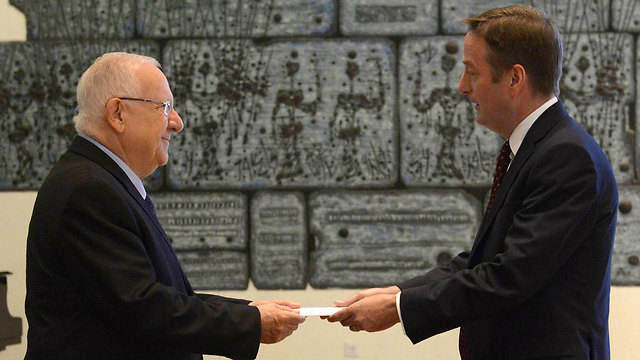
UK Ambassador: British government committed to fight against boycotts
Op-ed: British Ambassador to Israel David Quarrey relates his government's commitment to combating anti-Israel boycotts - in word and deed - as well as steps that could forward the pro-Israel effort.
I am glad that the British government’s opposition to boycotts is understood. Prime Minister David Cameron set it out in the Knesset in 2014. Mayor of London Boris Johnson repeated the message in Israel last November. Cabinet Office Minister Matthew Hancock announced new guidance which reiterates that British public bodies should not implement their own boycotts when he visited last month. Our commitment is practical - it’s not just words.
What about the British public? It’s hard to be precise, but I don’t believe there is widespread support for boycotts in the UK. We see little practical impact from calls for boycotts – our trade and investment are at record levels. A recent independent survey found that more than 80 percent of Israeli tech executives and investors are interested in collaboration with UK, and only 3 percent are concerned about opposition to Israel or anti-Semitism in the UK.
But support for boycotts is growing. I might disagree with it, but much of the criticism is within the bounds of legitimate debate in a democratic society. It reflects a genuine frustration with the lack of progress toward peace. Some of it is much uglier, with wholly unacceptable tones of anti-Semitism.
Where do we go from here? s long as there is no progress, I fear that support for boycotts will continue growing. This matters to Britain as well as Israel – we want a strong relationship. So we need to do three things.
First, we should maintain our clear opposition to boycotts. That message needs to be heard clearly and often.
Second, we should continue deepening our cooperation and showing the practical benefit it brings both countries. Next month I’ll chair the BIRAX meeting at Oxford University where 300 British and Israeli scientists will discuss ways to tackle, together, some of the world’s biggest health challenges. We recently celebrated the UK’s biggest export deal to Israel. Matthew Hancock used his visit to announce new UK/Israel cooperation on cyber. We are working together on how technology can transform transportation in our cities. On Wednesday I’ll welcome the Globe theatre – one of the UK’s most prestigious – to the Cameri to mark the 400th anniversary of Shakespeare’s death.
And third, things need to change on the ground. The battle against boycotts is much tougher when people can’t see a way forward. Most people are realistic about the challenges. The region is in chaos, and violence continues at an appalling human cost. But there are things that can be done, without compromising Israel’s security, to ease conditions on the ground, allow more economic development and construction, and help improve the prospects for renewed negotiation.
We all have a role in tackling boycotts, not least Israel in taking these steps that we believe are in Israel’s own interest and that build rather than weaken its international standing. It helps Israel’s friends when Israel takes the initiative. It only benefits those advocating boycotts when, for example, new settlement announcements are made.
I know issues around boycotts matter to Israelis. I wished Yedioth Ahronoth success with their (anti-BDS) conference. Let’s be clear in our opposition to boycotts. Let’s celebrate the cooperation which brings so much mutual benefit to our countries, including when Hamlet appears on the Cameri stage on Wednesday. But let’s also, even in difficult times, keep trying to find ways forward where we can.
The author of this piece is the United Kingdom's Ambassador to Israel.











